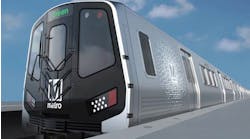PA: SEPTA rides may cost 21% more starting in January; severe service cuts could soon follow
By Thomas Fitzgerald
Source The Philadelphia Inquirer (TNS)
SEPTA is proposing to increase its fares 21.5% across the board on New Year's Day and plans severe service cuts next July, a combination described by the transit agency's budget director as the potential start of "managing the decline of the system."
A legal notice of the proposed fare hike was published Tuesday morning, triggering a required public hearing, which SEPTA has scheduled for Dec. 13 at the Convention Center.
"We've been talking about this for two years now," Erik Johanson, SEPTA's director of budgets and innovation, said in an interview. "We've been warning that this day was going to come, and we fear that [now] we're here."
Like other transit systems in the nation, SEPTA faces an annual structural deficit — $240 million, in its case — as federal pandemic aid for transit phases out. Earlier in the year, state Senate Republicans blocked Gov. Josh Shapiro's proposal to pump $283 million in new state aid to public transit by increasing its share of sales-tax revenue. That would have brought about $161 million to SEPTA.
Instead, lawmakers approved a one-time payment to the state trust fund for transit systems, of which SEPTA got $46 million.
Tuesday's announcement comes amid tense contract negotiations between SEPTA and its largest bargaining unit, Transport Workers Union Local 234, which represents bus, subway, and trolley operators in the city and other frontline workers.
SEPTA maintains it can ill afford a generous wage increase because of its fiscal crisis. Members have been working without a contract since Nov. 8, after TWU leaders postponed a strike to continue talks.
Both sides have indicated progress has been made on noneconomic issues raised by Local 234. In past years, SEPTA has also said it could not afford raises, but came through with them when talks broke down.
The authority's board of directors could vote on the higher fares at its Dec. 19 monthly meeting; if approved, they would take effect at the start of 2025. Riders would be paying a 21.5% increase on top of an interim average fare increase of 7.5% intended to take effect Dec. 1.
SEPTA last hiked fares in 2017, and officials say the Consumer Price Index of the cost of goods and services has increased 29% since then.
It expects the fare changes to generate $23 million for the rest of this fiscal year, and $45 million yearly beginning in 2026.
'Unusable service on weekends'
Possible overall service cuts of 20% are not imminent. They'd be implemented in the next fiscal year, which begins July 1 and runs through June 30, 2026.
The cuts would save an estimated $92 million in the first year and that could grow in future fiscal years as SEPTA begins to consider cuts in system infrastructure, such as by closing bus depots.
But SEPTA anticipates $40 million to $50 million in lost revenue yearly as it loses riders after cuts take hold. Net revenue would still help with a budget deficit that now stands at about $153 million after cost-cutting measures, increases in Regional Rail parking fees, and other steps. The agency also used the $46 million and some money from its service-stabilization working capital fund to avoid cuts and big fare hikes until this point.
Jody Holton, chief of planning and strategy for SEPTA, said cuts would include eliminating routes, shortening routes, and reducing the frequency of bus, trolley, subway, and Regional Rail service.
"There will be a lot of crowding on all of our [travel] modes, and we would basically have unusable service on weekends, on both Regional Rail and transit," Holton said.
Risk of 'death spiral'
Taken together, Holton and Johanson say SEPTA, the sixth largest transit system in the country, risks a "death spiral," a self-reinforcing process that happens when transit systems raise fares and cut service, driving customers away and requiring further fare hikes and cuts. About 790,000 people ride the SEPTA system on an average weekday.
They said the proposals are not political statements, but steps that must be taken soon because the agency cannot count on aid from Harrisburg.
Service cuts would be considered as part of SEPTA's regular budget process early next year.
Delaying cuts until July 1 leaves a narrow opportunity for the state legislature and governor to negotiate a measure increasing aid to public transit systems as part of writing the state budget, which is due June 30.
___
(c)2024 The Philadelphia Inquirer
Visit The Philadelphia Inquirer at www.inquirer.com
Distributed by Tribune Content Agency, LLC.


